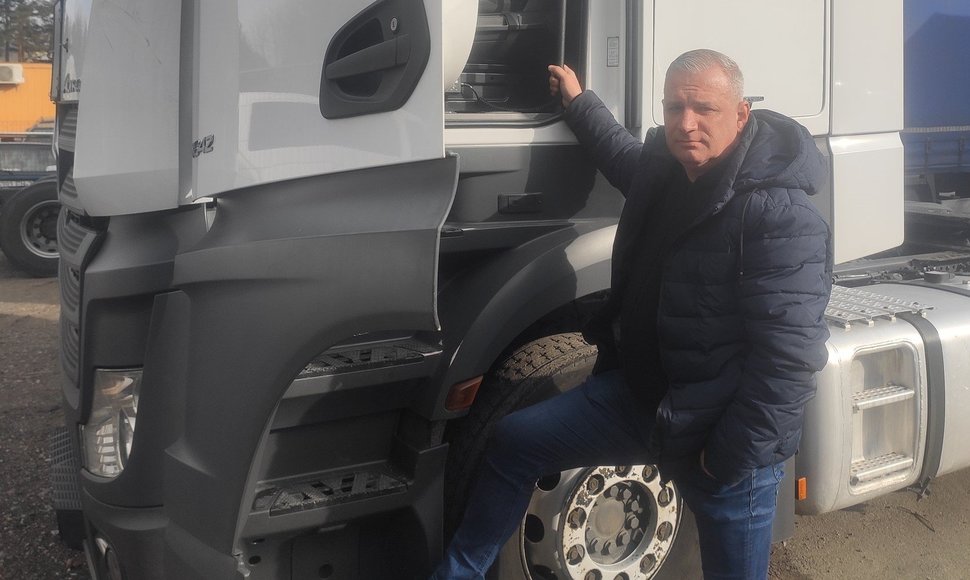"To me, as the head of a trade union representing drivers, having driven trucks across all of Europe for years, it is hurtful to see that politicians are handling our, the drivers', welfare as they imagine it, without inviting the drivers themselves to discussions," Gintaras Čiužas, the Baltic transport trade union Solidarumas chairman says.
For example, the provision that employers will have to house drivers overnight in motels so that they can rest well is laudable. The drivers' representative wonders though, why the driver can't choose themselves – resting in a motel or hotel or instead if the accommodation expenses can be added to one's wage.
Lack of motels offering quality resting in Europe
He emphasises that without a doubt, no driver would refuse to rest in a well-equipped motel. "But let's admit – we have all sorts of employers and most certainly, not all of them will rent single rooms for drivers to rest in. There will definitely be those, who will rent the cheapest accommodation for several people," G. Čiužas says.
According to the drivers, when staying with several people in one room, with each person having different needs – one watching television, another – cooking and a third deciding to rest more noisily, it will not be wholesome resting. Thus, some drivers would likely rather choose their truck's cabin, he notes.
"After all, in some cases, there aren't even any conditions to find a comfortable motel. The European Commission itself has recognised that alongside the main highways in Europe, there aren't enough motels to satisfy the needs of all drivers for accommodation," the leader of Solidarumas says.
Drivers concerned with security questions
Of course, the law will demand it; the employer will find a motel, perhaps further away from the parking location. However, drivers are concerned that during rest at a motel, which is at a distance from the parking lot, security issues will come up – fuel theft, theft from cabins, where significant wealth is accumulated, which are relevant problems even now.
Furthermore, if the truck must be left in the parking lot unattended, the question of accountability for the cargo arises. Trucks and trailers left in parking lots with valuable goods are the responsibility of the driver during the journey because he signs the bill of lading.
It is likely that upon establishing such a provision, everything will end with drivers often sleeping in their trucks' cabins, while money will be spent on motels to satisfy the demands of regulation despite how it could have been allocated to increasing drivers' wages.
Means of resting should be left up to drivers
"I do not doubt that most long haul drivers will agree with me that the means of resting should be left up to drivers to decide – simply pay out accommodation funding and allow them to decide where they would rather rest," G. Čiužas says.
He completely agrees that some drivers might choose to stay in the driver's cabin solely for the higher pay, but this would not be bad. The cabin should not be demonised – most drivers have them set up so that it would be safe, comfortable and definitely no worse than in many a roadside motel, the head of the long haul driver trade union says, having driven thousands of miles himself.
Running empty trucks around Europe won't increase wages
For him, as a driver, questions also arise in regard to the demand to return trucks to their native country every eight weeks – will such a provision really serve to improve transport sector staff welfare?
"Do agree, running empty trucks around Europe for thousands of kilometres, solely so that they would return and depart, this would also not contribute to increasing the drivers' wages or improving their living conditions.
Beyond how the returning of trucks by no means matches the EU's ecological aims, it also reduces safety on the roads and increases traffic congestion, lengthens a driver's journey home if they have to return with the truck. It is hard to imagine for non-long haul drivers what sort of traffic jams would happen in European, even our neighbouring Poland's highways if they would be filled with hundreds of trucks returning home, it might be necessary to spend holiday time in them. This is what the mobility package looks like through the eyes of a driver," G. Čiužas summarises.
Politicians do not care about drivers
According to him, the mobility package is fundamentally a tool for political figures to regulate the transport market, rather than improve the working conditions of transport sector staff.
"I hope that the provisions of the new mobility package will be correctly targeted during the final deliberations at the European Parliament toward the defence of long haul drivers' interests and the improvement of their social and labour conditions," G. Čiužas says.
Photos
- Gintaras Čiužas, chairman of the Baltic transport trade union Solidarumas
- Gintaras Čiužas has worked as a long haul driver himself, thus is well aware of the drivers' problems












